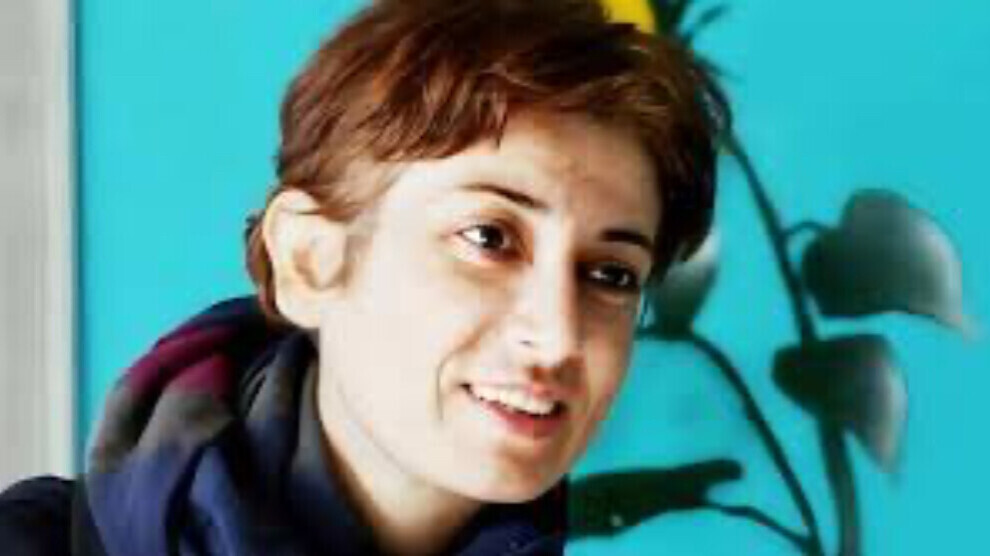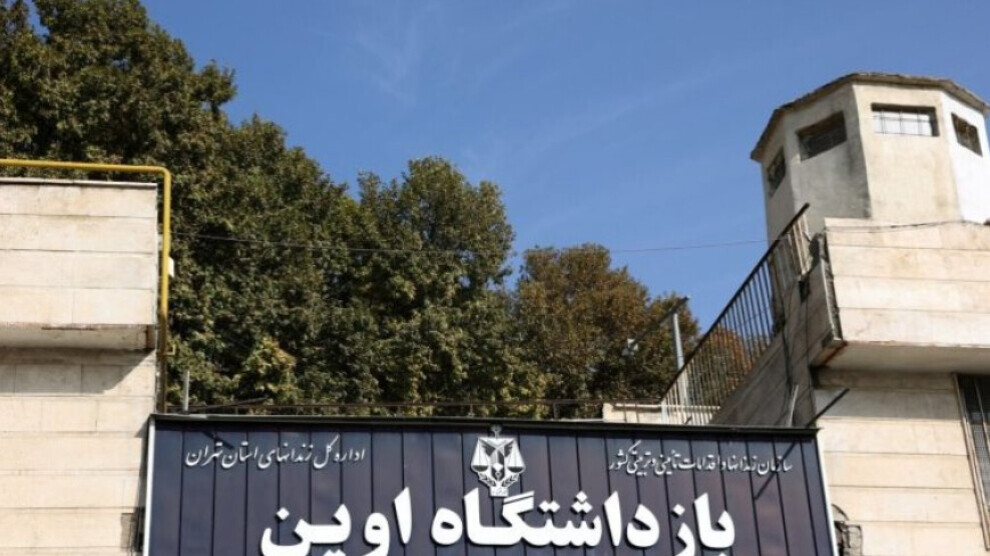WOMEN, LIFE, FREEDOM!
Pakshan Azizi, a social worker, women’s rights activist, and a prominent figure in the fight against gender and ethnic discrimination, has been sentenced to death in Iran.

ANF
NEWS DESK
Thursday, 26 December 2024
Pakshan Azizi, a social worker, women’s rights activist, and a prominent figure in the fight against gender and ethnic discrimination, was born in Mahabad.
For years, she advocated for victims of domestic violence and worked on empowering women. Pakshan Azizi organized awareness programs for women in Kurdish regions, educating them about their rights.
She also participated in cultural and social initiatives promoting gender equality and children’s rights. As a key member of local organizations, she worked tirelessly to amplify the voices of marginalized women and minorities.
Arrest and charges
In August 2023, Pakshan Azizi was arrested at her home by security forces. She was initially charged with offenses like "rebellion against the regime" (Baghi) and "propaganda against the state." Following an opaque trial, the Tehran Revolutionary Court, presided over by Judge Iman Afshari, sentenced her to death.
Reports indicate that Azizi endured severe physical and psychological torture during her detention in the Ministry of Intelligence's facilities to extract false confessions for crimes she did not commit.
Prison Conditions
Pakshan Azizi is currently held in the women’s political ward of Evin Prison under dire conditions:
Denied Legal Representation: Her lawyer was only allowed access to her case after the interrogation phase was completed.
Lack of Medical Care: Azizi suffers from physical issues due to torture but is denied adequate medical treatment.
Restricted contact with family: She has limited access to phone calls and is deprived of regular family visits.
Reactions and case significance
The death sentence for Pakshan Azizi has sparked widespread protests inside and outside Iran. Numerous human rights organizations, including Amnesty International and Human Rights Watch, have condemned the ruling and called for its immediate reversal.
Her fellow inmates in Evin Prison have staged several sit-ins and hunger strikes to show solidarity and protest the sentence.
Pakshan Azizi’s case has become a symbol of the systemic oppression of Kurdish women and the use of the death penalty as a tool to intimidate dissenters. This case reflects state policies targeting women’s and ethnic minorities' rights, aiming to silence their voices.
Despite the repression, Azizi and others like her have inspired resistance movements advocating for women’s rights and freedom both in Iran and globally.
Demands and expectations
Human rights activists, women’s advocates, and defenders of minority rights have emphasized in various statements the urgent need for international action to prevent her execution. These demands include:
Diplomatic pressure on the Iranian government to revoke death sentences.
Support for women’s and ethnic minority movements in Iran.
International campaigns to abolish the death penalty and free political prisoners.
Conclusion
Pakshan Azizi is a symbol of Kurdish women’s fight for justice, freedom, and equality. Her case highlights blatant human rights violations and the state’s use of violence to suppress dissent.
The "Women, Life, Freedom" movement, which emerged from Iran's protests, represents the determination of Iranian women and men to end oppression and authoritarian rule.
Together with other courageous imprisoned women, Pakshan Azizi continues to inspire society and reminds us of the urgent need for global solidarity to achieve justice and freedom.
Women in Iran face a complex combination of challenges and opportunities. Significant achievements have been made in the fields of education, art, and science. Yet, restrictive governmental laws and policies have made their situation difficult.

ANF
NEWS DESK
Tuesday, 24 December 2024, 12:02
Women in Iran face a complex combination of challenges and opportunities. On the one hand, significant achievements have been made in the fields of education, art, and science. On the other hand, restrictive governmental laws and policies, coupled with social and cultural discrimination, have made their situation difficult. This reality is particularly pronounced for women belonging to ethnic, religious, and political minorities, such as Kurdish or Baluch women.
Politically and socially active women are especially at risk of arrest, torture, and imprisonment. Cases such as Narges Mohammadi, Atena Daemi, Zeinab Jalalian, and Pakhshan Azizi are prominent examples of the suppression of protesting and active women.
The "Woman, Life, Freedom" (Jin, Jiyan, Azadi) movement, which in recent years has been accompanied by widespread protests, symbolizes women's demands for equal rights and greater freedoms. This movement has become one of the icons of the struggle for social justice and equality in Iran.
Women from ethnic, religious, and political minorities in Iran face compounded discrimination:
Kurdish and Baluch Women: These women often grapple with issues such as poverty, state violence, and discrimination in access to education and healthcare services.
Bahá'í and Christian Women: Women belonging to religious minorities face legal and social restrictions and are often deprived of job and educational opportunities.
Women political prisoners in Iran symbolize the intersection of gender-based oppression and state-sanctioned persecution of dissent. Among the most notable cases are Verishe Moradi, Pakshan Azizi, and Zeinab Jalalian, three Kurdish women whose lives and struggles highlight the plight of women caught in the crossfire of ethnic discrimination, systemic gender inequality, and authoritarian repression.
This dossier provides a comprehensive overview of their lives, activism, imprisonment, and the broader context of women’s political imprisonment in Iran.
Background and activism
Varisha Moradi
Varisha Moradi, a Kurdish activist and advocate for women’s rights, was committed to addressing the marginalization of Kurdish women. A community leader, Azizi’s activism focused on empowering women through education and resistance against cultural and state-imposed restrictions. Arrested during the 2021 protests, she has been accused of “Baghi” (armed rebellion) without evidence linking her to such acts.
Pakshan Azizi
Pakshan Azizi, a social worker and feminist, worked to support victims of domestic violence and promoted gender equality in Kurdish regions. She organized programs educating women about their rights and actively challenged patriarchal and state violence. Arrested in August 2023, Pakshan was tortured and falsely accused of rebellion against the regime, earning her a death sentence.
Zeinab Jalalian
Zeinab Jalalian is one of the longest-serving Kurdish women political prisoners in Iran. Arrested in 2008, she was accused of membership in the PJAK (Kurdistan Free Life Party), a charge she denies. Zeinab has been subjected to severe torture and denial of medical care, even as she suffers from life-threatening illnesses. Her case has drawn international attention to the plight of Kurdish women in Iranian prisons.
Arrest and Charges
The arrests of these women reflect systemic flaws in Iran’s judicial process:
Fabricated Charges: Charges like "Baghi," "spreading propaganda against the state," or "corruption on Earth" are frequently leveled without evidence.
Torture and Coerced Confessions: All three women reported being subjected to torture, including physical abuse, psychological intimidation, and prolonged solitary confinement.
Opaque Trials: They were denied access to legal representation during crucial phases of their trials. Court proceedings were brief, secretive, and predetermined, violating international standards of fair trials.
Prison Conditions
The conditions these women face reflect the harsh realities of political imprisonment in Iran:
Physical and Psychological Torture: Torture remains a widespread practice in Iranian detention centers, particularly for political prisoners.
Denial of Medical Care: Zeinab Jalalian has been denied medical treatment for serious illnesses. Pakshan Azizi and Varisha Moradi also suffer from untreated injuries due to torture.
Isolation and Harassment: Political prisoners, especially women, are isolated from their families and subjected to verbal abuse by prison authorities.
Restricted Communication: Access to family visits and legal counsel is severely limited.
Broader Context of Women Political Prisoners
Iran uses imprisonment as a tool to suppress dissent, with women often facing the dual burden of political persecution and gender discrimination:
Targeting Activists: Women involved in social movements, human rights advocacy, or protests are disproportionately targeted.
Ethnic and Gender Discrimination: Kurdish women, in particular, face compounded discrimination due to their ethnicity and gender.
Rise in Executions: Since the “Woman, Life, Freedom” protests, executions of women have increased dramatically. In 2023 alone, at least 24 women were executed, many of them Kurdish.
5. Global Reactions and Solidarity
The international community has condemned Iran’s treatment of women political prisoners:Human Rights Organizations: Groups like Amnesty International and Human Rights Watch have demanded immediate cessation of torture and unfair trials.
Global Campaigns: Calls to abolish the death penalty in Iran and to release all political prisoners have intensified.
Solidarity Movements: Women's rights organizations globally have rallied around these cases as emblematic of the broader struggle for freedom in Iran.
Significance of Their Cases
The cases of Verishe Moradi, Pakshan Azizi, and Zeinab Jalalian are significant because:Symbols of Resistance: They represent the resilience of Kurdish women against systemic oppression.
Injustice Highlighted: Their plight underscores the widespread judicial and human rights abuses in Iran.
Inspiration for Movements: Their courage inspires the global “Woman, Life, Freedom” movement.
Demands for Justice
The following steps are essential to address the injustices faced by these women:Immediate Action: Revocation of death sentences and release of all political prisoners.
Accountability: Investigations into torture allegations and judicial misconduct.
Abolition of the Death Penalty: A global campaign to end executions in Iran, especially for political dissenters.
Support for Families: Providing psychological and financial assistance to the families of political prisoners.
Conclusion
The stories of Verishe Moradi, Pakshan Azizi, and Zeinab Jalalian exemplify the courage and determination of Iranian women in the face of oppression. Their imprisonment and persecution are stark reminders of the urgent need for global solidarity in the fight for justice and human rights in Iran.
The rallying cry of “Woman, Life, Freedom” continues to echo worldwide, inspired by the sacrifices and struggles of these women and many others like them.

No comments:
Post a Comment